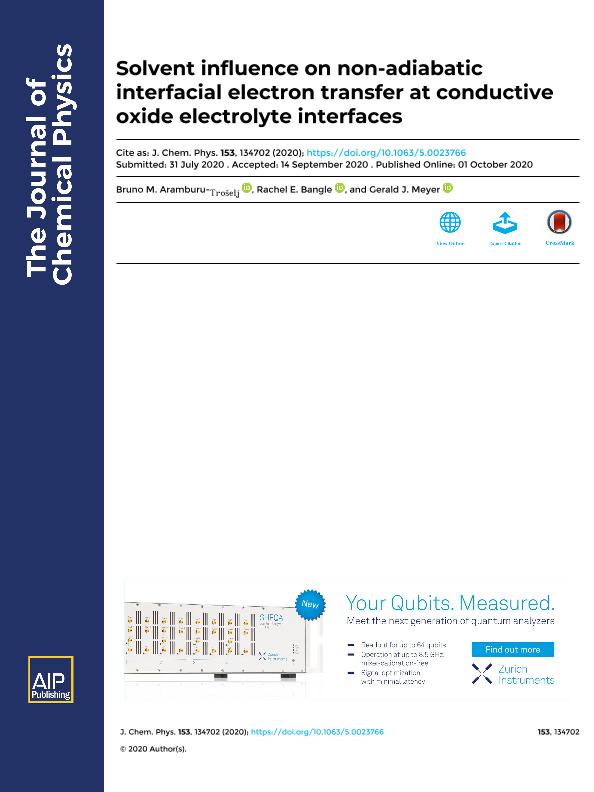Mostrar el registro sencillo del ítem
dc.contributor.author
Aramburu Troselj, Bruno Martín

dc.contributor.author
Bangle, Rachel E.
dc.contributor.author
Meyer, Gerald J.
dc.date.available
2023-11-06T12:14:33Z
dc.date.issued
2020-10
dc.identifier.citation
Aramburu Troselj, Bruno Martín; Bangle, Rachel E.; Meyer, Gerald J.; Solvent influence on non-adiabatic interfacial electron transfer at conductive oxide electrolyte interfaces; American Institute of Physics; Journal of Chemical Physics; 153; 13; 10-2020; 1-11
dc.identifier.issn
0021-9606
dc.identifier.uri
http://hdl.handle.net/11336/217055
dc.description.abstract
The kinetics for interfacial electron transfer (ET) from a transparent conductive oxide (tin-doped indium oxide, ITO, Sn:In2O3) to molecular acceptors 4-[N,N-di(p-tolyl)amino]benzylphosphonic acid, TPA, and [RuII(bpy)2(4,4′-(PO3H2)2-bpy)]2+, RuP, positioned at variable distances within and beyond the electric double layer (EDL), were quantified in benzonitrile and methanol by nanosecond absorption spectroscopy as a function of the thermodynamic driving force, -ΔG°. Relevant ET parameters such as the rate constant, ket, reorganization energy, λ, and electronic coupling, Hab, were extracted from the kinetic data. Overall, ket increased as the distance between the molecular acceptor and the conductor decreased. For redox active molecules within the Helmholtz planes of the EDL, ket was nearly independent of -ΔG°, consistent with a negligibly small λ value. Rips-Jortner analysis revealed a non-adiabatic electron transfer mechanism consistent with Hab < 1 cm-1. The data indicate that the barrier for electron transfer is greatly diminished at the conductor-electrolyte interface.
dc.format
application/pdf
dc.language.iso
eng
dc.publisher
American Institute of Physics

dc.rights
info:eu-repo/semantics/openAccess
dc.rights.uri
https://creativecommons.org/licenses/by-nc-sa/2.5/ar/
dc.subject
CHARGE TRANSFER
dc.subject
OXIDES
dc.subject
MOLECULES
dc.subject
ELECTRODES
dc.subject
KINETICS
dc.subject.classification
Físico-Química, Ciencia de los Polímeros, Electroquímica

dc.subject.classification
Ciencias Químicas

dc.subject.classification
CIENCIAS NATURALES Y EXACTAS

dc.title
Solvent influence on non-adiabatic interfacial electron transfer at conductive oxide electrolyte interfaces
dc.type
info:eu-repo/semantics/article
dc.type
info:ar-repo/semantics/artículo
dc.type
info:eu-repo/semantics/publishedVersion
dc.date.updated
2023-11-06T09:48:03Z
dc.journal.volume
153
dc.journal.number
13
dc.journal.pagination
1-11
dc.journal.pais
Estados Unidos

dc.description.fil
Fil: Aramburu Troselj, Bruno Martín. Consejo Nacional de Investigaciones Científicas y Técnicas. Oficina de Coordinación Administrativa Ciudad Universitaria. Instituto de Química, Física de los Materiales, Medioambiente y Energía. Universidad de Buenos Aires. Facultad de Ciencias Exactas y Naturales. Instituto de Química, Física de los Materiales, Medioambiente y Energía; Argentina
dc.description.fil
Fil: Bangle, Rachel E.. University of North Carolina; Estados Unidos
dc.description.fil
Fil: Meyer, Gerald J.. University of North Carolina; Estados Unidos
dc.journal.title
Journal of Chemical Physics

dc.relation.alternativeid
info:eu-repo/semantics/altIdentifier/doi/http://dx.doi.org/10.1063/5.0023766
Archivos asociados
